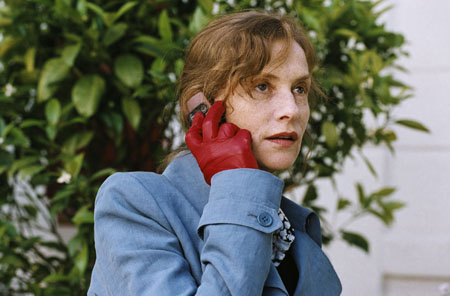

Reviews of Recent Independent, Foreign, & Documentary Films in Theaters and DVD/Home Video
Directed by: Claude Chabrol. Produced by Patrick Godeau. Written by: Odile Barski & Chabrol. Director of photography: Eduardo Serra. Edited by: Monique Fardoulis. Music by Matthieu Chabrol. Released by Koch Lorber. Language: French with English subtitles. Country of Origin: France. 110 min. Not Rated. With: Isabelle Huppert, François Berléand, Patrick Bruel, Robin Renucci, Maryline Canto & Thomas Chabrol. DVD Features: Making-of featurette. Trailer. Spring has come early. Like a breath of unexpected warm air, French actress Isabelle Huppert lowers her guard in Comedy of Power. With her concentration as unbending as ever, it’s hard to imagine her completely letting her guard down, but when she does here, her performance is unrecognizable from her recent films like Gabrielle and Nightcap (Merci pour le chocolat), her last outing with director Claude Chabrol. Unlike the latter, where Huppert had murder and revenge on her mind, high-profile Judge Jeanne Charmant Killman uncovers the massive white-collar crimes of France’s leading, and state-supported, oil conglomerate. (Apparently, French judges play a much wider investigative role than their American counterparts.) Chabrol has drawn upon the actual scandal involving the French company Elf Aquitaine, which squandered over 400 million in today’s dollars. (But as the opening disclaimer cheekily states: “Any resemblance to persons living or dead is, as they say, coincidental.”) As single-handedly as the maid of Orleans, it’s Jeanne vs. the company’s male establishment. But the rules of warfare have been slightly altered – an opening salvo: a defiant ex-CEO-turned-defendant sits down first before Jeanne takes her seat. An obsessive workaholic, she's at her computer in the middle of the night, too tired for sex, and with the constant cigarette. However, no seductive feminine wile comes into play when dealing with men nor does she become a passive manipulator like a certain Prada-heeled dragon lady. She charges fearlessly, with not one scene serving as a confessional or a revelation of self-doubt. Her self-assurance isn’t an attitude. She has no façade to hide behind. She’s right, and she knows it and that she’ll win. An unapologetic arriviste, this character is somewhat based on the judge involved in the Elf case, Magistrate Eva Joly, who was originally from Norway and came to Paris as an au pair, married the son of her employers, to their displeasure. A secretary by day, she worked her way through law school at night. Like Joly, Jeanne married the son of her wealthy employers. It’s only when she's drinking wine or washing dishes with her husband’s slacker nephew, who’s yet again changing jobs, that Jeanne laughs and eases her regal posture; he’s the one male who is not threatening or intimidating to her. The convoluted details of the scandal are left off screen, though the idea of a large international company involved in pay-offs and embezzlement shouldn’t be unfamiliar to American audiences. Extensive knowledge of the French legal system is not required; this conflict is personal.
Overall, this is the most accessible of Chabrol’s films released in the U.S. since Le Cérémonie. In a departure, the mystery isn’t in his characters’ behavior.
In fact, Jeanne openly declares to an adversary her intention to never give up. The emphasis is on the droll banter, supported by an energetic cast that never flags. The actor’s objectives are elegantly understated, but pointed. And if anything,
Jeanne could be seen as thoroughly American, a determined and self-made success story fighting elitist privilege. But with Chabrol’s wry outlook of
human behavior, there’s no way to confuse Huppert for Frank Capra’s Jean Arthur.
Kent Turner
|